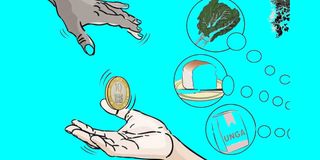What 10 bob means to average Kenyan family

To the average Kenyan, 10 bob can change a family’s life.
What you need to know:
- Sometimes the average man in Kenya feels like he is living in exile.
- There are times when he feels like a beggar.
Newsflash: The average Kenyan family doesn’t survive on “x” dollars per day, but 10 bob. Here’s what I mean: the average Kenyan family has to pinch pennies and save and scrounge shillings to have 10 bob to make ends meet.
The proposed 16 per cent value-added tax (VAT) would not only raise the price of a 400-gramme loaf of bread by Sh10, but it would also increase the number of families that careen into poverty. And for our callous leaders to insinuate that this tax would curb the spread of diabetes is akin to starving the common man to death and thereafter letting loose phlegm on his poor corpse, then claiming the yucky stuff is the kiss of life that will guarantee him eternal life.
Man, that’s how low this country has sunk. If out of touch was a person, it would be our political leaders.
Exiled in his own land
The times we’re living—sorry, surviving—reminds me of the poem “Un clochard m’a demandé dix sous”, by Leon Damas, the politician, poet and one of the founders of the Negritude movement.
In this poem, Damas laments thus: “I too have been hungry in this damn worthless country, I too thought I could ask for 10 cents, out of pity for my empty stomach.”
Damas’ poem chronicles the plight of an exiled black person in Paris, and the penury and poverty he suffers, to an extent that —though he’s an intellectual—he feels like he’s the dregs of society and can beg for 10 cents.
Sometimes the average man in Kenya feels like he is living in exile. There are times when he feels like a beggar. The only thing that stops him from panhandling is his pride.
Wait. Wait a minute. The average man begs in public on national television. What do you think all those implorations of “Naomba serikali” mean?
In societies where systems function, employers —aka taxpayers—don’t beg their employees to work. But—oops, I almost forgot —this is Kenya.
Hard choices
I am an average Kenyan family man. And so are millions of Kenyans who are not only skipping meals but—every mealtime —have been forced to make hard choices.
Hard choices between buying bread and buying biros. Hard choices between buying sukuma wiki and salad oil. Hard choices between buying milk or tea leaves.
And all these hard choices have one common denominator—10 bob. To the average Kenyan family, 10 bob is the difference between eating supper and Ascaris lumbricoides feasting on what’s left of your thinning intestines.
Miracles performed by 10 bob
Because Kenyan leaders are living in their own soft-life world, far removed from the real life of the common man, let me bring them down to hard earth for a minute. Let me tell them the miracles 10 bob can perform.
In many urban estates, 10 bob is the price of a chicken head, neck and legs. That’s a sumptuous chicken supper for the family.
Ten bob is the price of five spoonfuls of sugar. Don’t abuse us, talking about 10 bob is the price of a pair of painkiller tablets, which men in this country need to cure their incessant migraines caused by issues of life.
Ten shillings can buy two paltry bunches of sukuma wiki, containing six or seven leaves of this staple. The leaves in a bunch decrease with each national budget, though the price remains constant.
Ten shillings can buy several nyanya bondeka. These are squashed and partly soggy tomatoes that, in earlier, better days of this country, were given to pigs or other farm animals and poultry.
Dear leaders, to the average Kenyan family, 10 bob is change. And I don’t mean pocket change. It’s not a small change. It’s a big change. Ten bob can change a family’s life.
jowasonga@gmail





